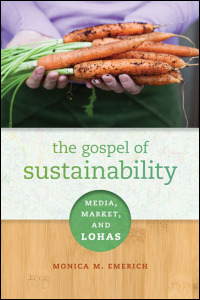 How are we to live? This deeply spiritual, moral, and ethical question of the ages is the heartbeat of the LOHAS—the Lifestyles of Health and Sustainability—marketplace, estimated to appeal to nearly 20% of the U.S. population alone. By its nature, this question compels us to think about the purpose of our lives, about the substance of our communities, about the rights of the nonhuman, and about boundaries of respect and tolerance. The answer (more likely the “answers”) to the question shape and inform our understanding of “truth,” of the sacred.
How are we to live? This deeply spiritual, moral, and ethical question of the ages is the heartbeat of the LOHAS—the Lifestyles of Health and Sustainability—marketplace, estimated to appeal to nearly 20% of the U.S. population alone. By its nature, this question compels us to think about the purpose of our lives, about the substance of our communities, about the rights of the nonhuman, and about boundaries of respect and tolerance. The answer (more likely the “answers”) to the question shape and inform our understanding of “truth,” of the sacred.
The question doesn’t limit itself to matters of our survival (as in “how are we going to get enough to eat?”), but rather it also embraces the thorny problem of ethics (as in, “is it really fair that we eat that?”). These concerns have historically been understood as the provenance or the problem of church, elder, shaman, or other moral leader. In the LOHAS marketplace, they’ve been entrusted to the hands of the local grocer or the pages of your favorite magazine; they are articulated in very public, mediated, and commodified ways. Business, as they say, is booming in LOHAS, and while the endgame is still profit it’s no longer acceptable at any price.
An article in the spring 2008 issue of The LOHAS Journal, stated, “Businesses the world over are leveraging LOHAS as a way to understand the consumption preferences of a growing number of people who care deeply about personal, community, and planetary health and well-being, and are willing to spend accordingly.” This captured three key facts about LOHAS. First, even though the word “LOHAS” only entered the pubic lexicon in 1999 via a small publishing firm in Broomfield, Colorado, the concept has managed to go global. Second, LOHAS designates a marketplace of goods and services, one immersed in an intricate web of deeply meaningful personal values about the “self” and about the social and natural worlds. Third, the assertion obfuscates issues of class–about who can pay to play in LOHAS–and frames it instead as an issue of personal choice, as an issue of willingness to spend rather than an ability to spend. Can LOHAS media and market organizations continue to make an appeal for a moral and spiritual reordering of the world via a transformed capitalism without falling prey to certain potentially eroding market imperatives?
The worldview of LOHAS is articulated through its texts—through articles, advertising, lectures, trade shows, commodities and more. They target the “conscious consumer”— articulated as a person who accepts the notion that health involves not just healing and balancing one’s own mind, body, and spirit but also healing the social and natural worlds in tandem.
To develop that consciousness, LOHAS media and market construct health and sustainability as metonyms for spirituality, using these terms freely and normatively. But can these organizations guard the “sacrality” of those keywords as well as the ritualized commodities that bear them on product labels? Market pressures to earn quick profit tempt companies to green-wash—the term for trying to give an environmentally friendly sheen to products that are only marginally so. The same thing can occur with “spiritual-washing”– painting products with an egg-glaze sheen of LOHAS values regarding the health of people, communities and environments.
The late Anita Roddick, founder The Body Shops, once said companies are now more “powerful than governments and wealthier than most countries” and, because of that they “must have a moral center,” focusing as much on social justice and human rights as on making a profit because their acts “ripple-affect millions (Middendorf 2001, 31). Can media and market organizations resist the temptation to market to elites, those who can afford the hefty price tags of sustainable products? Can market organizations sustain their own visionary edge, their contestation to the status quo, and generate a spirituality of sustainability that is accessible and affordable or will “consciousness” be the new appellation for the wealthy?
References
Middendorf, B. (2001). Business with a passion. The LOHAS Journal, 2(4), 30 – 32.
*****
Monica M. Emerich is a research affiliate at the Center for Media, Religion, and Culture at the University of Colorado, Boulder, the president of Groundwork Research & Communications in Lafayette, Colorado, and the author of The Gospel of Sustainability: Media, Market, and LOHAS.
